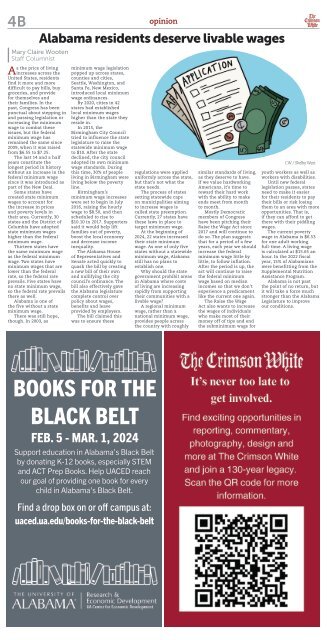The Crimson White Print Edition - February 8th, 2024
Create successful ePaper yourself
Turn your PDF publications into a flip-book with our unique Google optimized e-Paper software.
4B<br />
As the price of living<br />
increases across the<br />
United States, residents<br />
find it more and more<br />
difficult to pay bills, buy<br />
groceries, and provide<br />
for themselves and<br />
their families. In the<br />
past, Congress has been<br />
punctual about stepping in<br />
and passing legislation or<br />
increasing the minimum<br />
wage to combat these<br />
issues, but the federal<br />
minimum wage has<br />
remained the same since<br />
2009, when it was raised<br />
from $6.55 to $7.25.<br />
<strong>The</strong> last 14 and a half<br />
years constitute the<br />
longest period in history<br />
without an increase in the<br />
federal minimum wage<br />
since it was introduced as<br />
part of the New Deal.<br />
Some states have<br />
created state minimum<br />
wages to account for<br />
the increase in prices<br />
and poverty levels in<br />
their area. Currently, 30<br />
states and the District of<br />
Columbia have adopted<br />
state minimum wages<br />
higher than the federal<br />
minimum wage.<br />
Thirteen states have<br />
the same minimum wage<br />
as the federal minimum<br />
wage. Two states have<br />
minimum wages that are<br />
lower than the federal<br />
rate, so the federal rate<br />
prevails. Five states have<br />
no state minimum wage,<br />
so the federal rate prevails<br />
there as well.<br />
Alabama is one of<br />
the five without a state<br />
minimum wage.<br />
<strong>The</strong>re was still hope,<br />
though. In 2003, as<br />
opinion<br />
Alabama residents deserve livable wages<br />
Mary Claire Wooten<br />
Staff Columnist<br />
minimum wage legislation<br />
popped up across states,<br />
counties and cities,<br />
Seattle, Washington, and<br />
Santa Fe, New Mexico,<br />
introduced local minimum<br />
wage ordinances.<br />
By 2020, cities in 42<br />
states had established<br />
local minimum wages<br />
higher than the state they<br />
reside in.<br />
In 2015, the<br />
Birmingham City Council<br />
tried to influence the state<br />
legislature to raise the<br />
statewide minimum wage<br />
to $10. After the state<br />
declined, the city council<br />
adopted its own minimum<br />
wage standards. During<br />
this time, 30% of people<br />
living in Birmingham were<br />
living below the poverty<br />
line.<br />
Birmingham’s<br />
minimum wage increases<br />
were set to begin in July<br />
2016, raising the hourly<br />
wage to $8.50, and then<br />
scheduled to rise to<br />
$10.10 in 2017. Supporters<br />
said it would help lift<br />
families out of poverty,<br />
boost the local economy<br />
and decrease income<br />
inequality.<br />
<strong>The</strong> Alabama House<br />
of Representatives and<br />
Senate acted quickly to<br />
quash the bill by creating<br />
a new bill of their own<br />
and nullifying the city<br />
council’s ordinance. <strong>The</strong><br />
bill also effectively gave<br />
the Alabama legislature<br />
complete control over<br />
policy about wages,<br />
benefits and leave<br />
provided by employers.<br />
<strong>The</strong> bill claimed this<br />
was to ensure these<br />
regulations were applied<br />
uniformly across the state,<br />
but that’s not what the<br />
state needs.<br />
<strong>The</strong> process of states<br />
setting statewide caps<br />
on municipalities aiming<br />
to increase wages is<br />
called state preemption.<br />
Currently, 27 states have<br />
these laws in place to<br />
target minimum wage.<br />
At the beginning of<br />
<strong>2024</strong>, 22 states increased<br />
their state minimum<br />
wage. As one of only five<br />
states without a statewide<br />
minimum wage, Alabama<br />
still has no plans to<br />
establish one.<br />
Why should the state<br />
government prohibit areas<br />
in Alabama where costs<br />
of living are increasing<br />
rapidly from supporting<br />
their communities with a<br />
livable wage?<br />
A regional minimum<br />
wage, rather than a<br />
national minimum wage,<br />
provides people across<br />
the country with roughly<br />
similar standards of living,<br />
as they deserve to have.<br />
If we value hardworking<br />
Americans, it’s time to<br />
reward their hard work<br />
with the ability to make<br />
ends meet from month<br />
to month.<br />
Mostly Democratic<br />
members of Congress<br />
have been pitching their<br />
Raise the Wage Act since<br />
2017 and will continue to<br />
do so. <strong>The</strong> plan suggests<br />
that for a period of a few<br />
years, each year we should<br />
increase the federal<br />
minimum wage little by<br />
little, to follow inflation.<br />
After the period is up, the<br />
act will continue to raise<br />
the federal minimum<br />
wage based on median<br />
incomes so that we don’t<br />
experience a predicament<br />
like the current one again.<br />
<strong>The</strong> Raise the Wage<br />
Act also wants to increase<br />
the wages of individuals<br />
who make most of their<br />
money off of tips and end<br />
the subminimum wage for<br />
CW / Shelby West<br />
youth workers as well as<br />
workers with disabilities.<br />
Until new federal<br />
legislation passes, states<br />
need to make it easier<br />
for their residents to pay<br />
their bills or risk losing<br />
them to an area with more<br />
opportunities. That is,<br />
if they can afford to get<br />
there with their piddling<br />
wages.<br />
<strong>The</strong> current poverty<br />
wage in Alabama is $6.53<br />
for one adult working<br />
full-time. A living wage<br />
is calculated at $15.65 an<br />
hour. In the 2022 fiscal<br />
year, 15% of Alabamians<br />
were benefitting from the<br />
Supplemental Nutrition<br />
Assistance Program.<br />
Alabama is not past<br />
the point of no return, but<br />
it will take a force much<br />
stronger than the Alabama<br />
Legislature to improve<br />
our conditions.<br />
BOOKS FOR THE<br />
BLACK BELT<br />
FEB. 5 - MAR. 1, <strong>2024</strong><br />
Support education in Alabama’s Black Belt<br />
by donating K-12 books, especially STEM<br />
and ACT Prep Books. Help UACED reach<br />
our goal of providing one book for every<br />
child in Alabama’s Black Belt.<br />
Find a drop box on or off campus at:<br />
uaced.ua.edu/books-for-the-black-belt

















